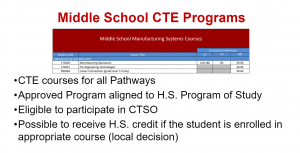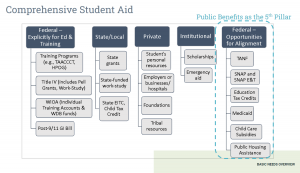Advance CTE’s 2022 Fall Meeting, held last week, included five breakout sessions that equipped state leaders to support every learner in CTE by tailoring support to meet unique and intersecting learner population needs.
Keep reading for key takeaways and resources from each session shared by state CTE leaders and our Advance CTE-ECMC Fellows!
Serving Middle Grades Learners through Career Supports
 Career advising and development supports geared towards middle grades learners to improve access and achieve high-quality and equitable secondary CTE programs prove to be an early opportunity to develop an occupational identity and better build social capital. Ohio discussed the policy structures the state has put into place to support learners in CTE programs before they enter high school, including funding mechanisms and alignment of middle grades programs of study. Michigan Advance CTE-ECMC Fellow Tony Warren shared how states and regions can broaden a middle schoolers mindset by focusing on the challenge they want to solve and helping develop a pathway to achieve a goal centered on their intrinsic motivations. Fellow Donald Walker provided local examples of carrying out state policy and practice at the Detroit School of the Arts showcased how one school is putting state policy into practice and action.
Career advising and development supports geared towards middle grades learners to improve access and achieve high-quality and equitable secondary CTE programs prove to be an early opportunity to develop an occupational identity and better build social capital. Ohio discussed the policy structures the state has put into place to support learners in CTE programs before they enter high school, including funding mechanisms and alignment of middle grades programs of study. Michigan Advance CTE-ECMC Fellow Tony Warren shared how states and regions can broaden a middle schoolers mindset by focusing on the challenge they want to solve and helping develop a pathway to achieve a goal centered on their intrinsic motivations. Fellow Donald Walker provided local examples of carrying out state policy and practice at the Detroit School of the Arts showcased how one school is putting state policy into practice and action.
Supporting CTE Learners in Rural Communities
Representatives from Montana and California shed light on the challenges and opportunities faced by CTE students who reside in rural areas of the United States. With a majority of Montana (46 out of 56 counties) being part of the frontier, the state has implemented the Hub & Spoke model for several programs. One such example is healthcare, which enabled a main campus to establish a healthcare program, complemented by satellite campuses through partnerships with local secondary and post-secondary institutions that offer limited services distributed across the other counties.
Fellow Jean Claude Mbomeda shared California’s approach for reviewing disaggregated data to identify gaps in CTE programs in rural communities colleges in California, which was discussed as a necessary first step to unearth opportunities and develop supports for learners.
Ensuring the Basic Needs of Postsecondary and Adult Learners are Met
 An education consultant and a state leader from Wisconsin provided an overview of programs that support learners basic needs, while elevating that many programs still create barriers for learners to complete credentials. Immediate next steps that were shared included making integrated benefits applications for federal assistance programs available online and inviting benefits coordinators to provide services on campus. Wisconsin highlighted their steps to create affinity groups with faculty and staff, with Dr. Colleen McCabe stating “To understand the effects of poverty, you have to explore learners’ multiple identities.”
An education consultant and a state leader from Wisconsin provided an overview of programs that support learners basic needs, while elevating that many programs still create barriers for learners to complete credentials. Immediate next steps that were shared included making integrated benefits applications for federal assistance programs available online and inviting benefits coordinators to provide services on campus. Wisconsin highlighted their steps to create affinity groups with faculty and staff, with Dr. Colleen McCabe stating “To understand the effects of poverty, you have to explore learners’ multiple identities.”
Maximizing the CTE Experience for Learners with Disabilities
Maryland and Nebraska equipped attendees with state-level strategies to leverage Perkins state plans, the Comprehensive Local Needs Assessment (CLNA) and interagency partnerships to provide sustainable support to learners with disabilities. With one in four Americans identifying as having a disability, discussions centered on viewing disability as a spectrum, both visible and hidden, and centering learners as people rather than just a population. Maryland shared practices for empowering local leaders to identify and act on opportunity gaps for learners with disabilities through and the CLNA. Nebraska emphasized the importance of developing consistent cross-agency routines, and highlighted their recent achievement of a tri-agency conference across, CTE, vocational rehabilitation and special education.
Equitably Serving CTE Learners in Correctional Education
With more than 30,000 youth being incarcerated in the United States each year in the juvenile justice system, Texas joined by Advance CTE-ECMC Fellows Richard Crosby and Janelle Washington discussed the differences in secondary and postsecondary CTE programs, as well as some of the intricacies of carceral justice-connected program designs. Texas highlighted barriers for this learner populations, including unfair placement testing that occurs days after sentencing and the availability of CTE programs that will not incentivize recidivism. The panelists shared that establishing meaningful and collaborative partnerships with correctional agencies and state CTE departments are paramount to creating better and more equitable programming opportunities for carceral students.
Here are additional resources to support every learner in CTE:
- Broadening the Path: Design Principles for Middle Grades CTE
- Connecting Rural Learners to the World of Work
- Advancing Employment for Secondary Learners with Disabilities through CTE Policy and Practice
- Making Good on the Promise: Improving Equity and Access to High-Quality CTE for Youth and Young Adults in the Justice System
Nithya Govindasamy, Senior Advisor
Tags: Adult Learners, California, Correctional Education, CTE Fall Meeting, Maryland, Michigan, Middle Grades CTE, Montana, Nebraska, Ohio, postsecondary cte, Rural CTE, students with disabilities, texas, wisconsin

